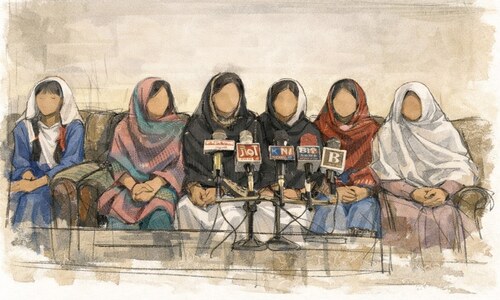School Education
Mohammad Ali Jinnah received his primary education at home. When he turned six, his parents “engaged a teacher to teach him Gujarati at home,” as they were not willing to send their son to school at such a young age, stated his sister Fatima Jinnah in her book My Brother.
From the very beginning, Jinnah loathed mathematics, although his father, Poonja Jinnah, placed the utmost importance on that subject. His first available educational record relates to his admission at the Sindh Madressatul Islam (SMI) on July 4, 1887, where he was admitted to Standard I of the English Branch (secondary education).
According to the records, his sect is mentioned as “Khoja” and Karachi is listed as his birthplace. In the column under “previous instructions”, it was noted that Jinnah had completed class four (primary education) in Gujarati.
But this admission proved to be short-lived and ended with the recorded remarks: “Left for Bombay.”
The reason for this departure was Jinnah’s paternal aunt, Manbai. Jinnah was very fond of her as “she was a great storyteller”, whose “tales of fairies and the flying carpets; of jinns and dragons” enthralled children, remembered Fatima. When Manbai returned to Bombay, Jinnah also accompanied her. There she got him admitted at the Anjuman-e-Islam School.
But like his previous admission at SMI, this too was short-lived, because Jinnah’s mother could not stand her favourite son being away in Bombay. Jinnah was sent back to Karachi, where he was readmitted to SMI on December 23, 1887. For the first time, his date of birth was recorded in written form as “October 20, 1875” in this entry. He continued to study at SMI till January 5, 1891, when his admission ended due to his “long absence.”
The educational journey of the Quaid-i-Azam has not received adequate scholarly attention. How did a boy educated in Gujarati at home and weak in mathematics end up at the Bar in London? On his 146th birth anniversary, Dr Muhammad Ali Shaikh sheds some light…
Jinnah returned to SMI for a third time on February 9, 1891, where he was admitted to Standard IV. He continued his schooling here till January 30, 1892, when he left SMI for the final time, while studying in Standard V. The reason for leaving the institution was mentioned as “Left for Cutch on marriage.”

After solemnising his marriage with Emibai in Cutch, Jinnah returned to Karachi and this time got an admission at the Church Mission Society’s (CMS) High School. There he studied from March 8 to October 31, 1892, after which he left his school studies for good while studying in Standard VI, a year short of qualifying for the matriculation examinations.
So how good of a student was Jinnah? Based on all accounts, absences and mathematical weaknesses aside, he was an intelligent and hardworking pupil. His biographer, Hector Bolitho, shared an anecdote told to him by Fatima Bai who lived with Jinnah’s family during his childhood.
She stated, “He was a good boy... We lived, eight of us, in two rooms on the first floor of the house on Newnham Road. At night, when the children were sleeping, he would place a sheet of cardboard against the oil lamp, to shield the eyes of the children from the light. Then he would read and read. One night I went to him and said, ‘You will make yourself ill from so much study’, and he answered, ‘Bai, you know I cannot achieve anything in life unless I work hard.’”
However, Jinnah’s father considered a strong command over mathematics a prerequisite for practising business, and Jinnah’s continued weakness in that subject greatly perturbed him. Due to this, a British business associate of Poonja’s suggested to him that he should send Jinnah to London to work as an apprentice at the head office of Graham’s Shipping and Trading Company. This idea appealed to his father who swiftly sent Jinnah to London, terminating his education in Karachi.
Lincoln’s Inn in London
Jinnah reached London in the winter of 1892-93, and he later recounted that the harsh winter made him gloomy. “I was young and lonely. Far from home: far from my parents. I was in a new country, where life was so different from the life I had known in Karachi,” he told Fatima.
At the office, he was assigned a workstation and entrusted with ledgers to work on. But this did not interest Jinnah. “It did not suit his genius to prepare himself for a business career, where the highest ambition in life was to see that, from year to year, one’s assets exceed one’s liabilities, enabling one to gradually amass a big fortune,” opined Fatima.
Instead of business, Jinnah developed an interest in the lives and ideals of great leaders and was highly inspired by them. He “discovered that many of them had studied for the Bar,” and he decided to pursue law at Lincoln’s Inn, wrote Fatima.
“Fortunately for me, that year was the last when one could obtain admission by passing the examination known at that time as ‘Little Go’... So, I decided to give up my apprenticeship with Grahams and study hard to get through the ‘Little Go,’” Jinnah recalled.
However, there was an obstacle, as the test required clearing a paper in Latin. Jinnah did not know Latin and hence opted to seek an exemption from appearing in that subject. In his hand-written application, dated April 25, 1893, he wrote, “Having learnt that I shall be examined in the Latin Language, I request you in this petition to grant me dispensation for the following reasons: (I) Being a native of India I have never been taught this language. (II) I know several Indian languages, which we are required to learn as our classics or second languages. (III) Thus, having spent my time in learning other languages…, I have not been able to learn the Latin language and which if I am compelled to learn will take some years to pass the required exam.”
His request was granted and he passed the test. Accordingly, he was admitted to the Inn on June 5, 1893. His admission entry reads, “Muhamedali Jinnabhoy, of Karachi, India (19), i.s. Jinnabhoy of Karachi, Sindh, India, afsd., merchant,” where “(19)” denoted his age, while “i.s.” meant that he was the first son of his father.
This change in career plans greatly upset Jinnah’s father, who insisted that he should “give up this unprofitable pursuit and return home immediately.” But Jinnah pleaded with his father to “allow him to remain in England and to complete his studies for the Bar,” Fatima wrote.
Once on his chosen path, Jinnah fully devoted himself to his studies. He became an avid reader, frequenting libraries while also amassing a vast collection of books himself. He used to write his name on some of his personal books. On one such book he wrote, “This book is mine till I am dead. Steal not this for fear of shame. So, here’s the owner’s name. M.A. Jinnah, 10 September 1895.”
His teachers quickly developed a very favourable opinion of him. One of them, Sir Howard Elphinstone, remarked that he was “an able man and likely to do well in anything that he turns his attention to.” Another instructor, Barrister Douglas Edwards, wrote that Jinnah “displayed much diligence, quickness and intelligence,” which led him to form a “favourable opinion as to his intellectual ability.”
Towards the end of his studies at the Inn, Jinnah decided to drop the suffix ‘bhai’ from his surname Jinnabhai. In his application dated March 30, 1896, he wrote that he was “desirous of dropping the ending of my name, namely bhai, meaning Mr…. It being customary in India, at the time of my admission, I happened to give the name after that fashion… The name should be M.A. Jinnah and in full Mahomed Alli Jinnah.” His request was approved, and the name was modified accordingly.
Equipped with a Bar at Law from Lincoln’s Inn, Jinnah returned to Karachi in the summer of 1896, ready for an onward journey to Bombay, to embark upon the next phase of his life.
The writer is author of Quaid-e-Azam Mohammad Ali Jinnah: Education, Struggle and Achievements and a former vice-chancellor. He tweets @DrMAliShaikh.
Published in Dawn, EOS, December 25th, 2022































